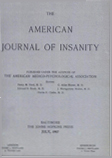PSYCHIC MANIFESTATIONS IN CASES OF BRAIN TUMORS
Abstract
In reviewing the psychic changes in brain tumors it will be found that they tend to arrange themselves into three groups:
The General Symptoms.—These are as vague and difficult of interpretation as are other general symptoms from a neurologic standpoint. The more generalized symptoms are as follows:
1. Mild mental and physical let-down (neurasthenic states).
2. Mild changes in personality (indifference, inadequacy, witzelsucht).
3. Anxiety states.
4. Depressive reactions.
5. Mental confusion.
6. Deteriorating states, simulating:
a. Epilepsy.
b. Arteriosclerosis.
c. Senile dementia.
d. Vascular lesions.
e. Traumatic lesions.
f. Dementia paralytica.
g. Dementia præcox (catatonic states).
These reactions are rarely ever sufficient to aid in the localization of a tumor, but frequently may serve as a clue to the correct diagnosis.
Specific Mental Reactions.—1. Lack of affect (change in personality).
2. Impaired mental grasp (lack of memory, interest and attention).
3. Impaired insight and judgment.
4. Impaired mental activity (poverty of thought processes).
5. Disturbances of general motility (psychosomatic).
When these factors are present, in the absence of any focal neurologic signs, one may speak of a frontal lobe syndrome, understanding that this is not a positive syndrome, but is very suggestive of a lesion in the forward portion of the cerebrum. These mental changes may be of varying intensity, show marked fluctuations, and, as a rule, appear late in the disease, the minor changes probably having been entirely overlooked in the early stages of the affection.
Associated Mental Reactions.—Under this heading are considered the mental states associated with brain tumors, in which a direct relationship is difficult to establish. Thus hysterical episodes, maniacal states, or other psychotic states which occasionally lead to institutional confinement may at times be quite independent of the effects of the neoplasm. Undoubtedly the marked changes brought about by a new growth in the brain are likely to precipitate psychic alterations, especially in neuropathic individuals in whom the stabilizing qualities are none too good.
In conclusion it may be stated that a psychiatric examination is of considerable aid in all cases of suspected brain tumor, regardless of location, type of tumor, stage of the disease process, or mental status of the patient.
Access content
To read the fulltext, please use one of the options below to sign in or purchase access.- Personal login
- Institutional Login
- Sign in via OpenAthens
- Register for access
-
Please login/register if you wish to pair your device and check access availability.
Not a subscriber?
PsychiatryOnline subscription options offer access to the DSM-5 library, books, journals, CME, and patient resources. This all-in-one virtual library provides psychiatrists and mental health professionals with key resources for diagnosis, treatment, research, and professional development.
Need more help? PsychiatryOnline Customer Service may be reached by emailing [email protected] or by calling 800-368-5777 (in the U.S.) or 703-907-7322 (outside the U.S.).



